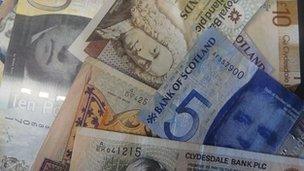Bank of Where?
- Published

John Swinney says sterling is "as much Scotland's currency as it is the currency of England".
What is there to stop another meltdown of Scotland's financial institutions? Good regulation, of course. But by whom?
It seems an independent Scotland would look to the Bank of England to provide that cross-border security.
That may not look a whole lot like independence. But it might provide some reassurance to bank customers, to financial institutions themselves and - let's not forget - to referendum voters.
To rewind, the failure of the tripartite regulation by the Bank of England, Financial Services Authority (FSA) and UK Treasury is blamed for the near failure of Royal Bank of Scotland (RBS) and Halifax Bank of Scotland (HBOS).
And the rescue for those two giants is credited to the capacity of the UK Government to borrow enough money to bail them out, followed by a sharp devaluation of the pound to help soften the blow. With its own central bank and its own currency, the UK had the flexibility that troubled eurozone countries now conspicuously lack.
Both the coalition government at Westminster and the SNP one at Holyrood have blamed the previous regulatory regime for failing to spot the systemic risk posed by hyper-risky banks. They focussed instead on individual institutions, and apparently failed to do that particularly well.
So we've got reform already under way. The Bank of England is taking over from the FSA that role of overseeing institutions and their systemic risk. Other bodies will concern themselves with specific oversight of individual institutions' balance sheets (the Prudential Regulation Authority, or PRA) and another still (the Financial Conduct Authority, or FCA) to oversee the management of financial firms, promoting competition and consumer protection.
"Sensible"
How might this look if Scotland were independent? John Swinney, the finance secretary, delivered a lecture at Glasgow Caledonian University on Monday that offered some insight into his thinking. This was in the context of explaining why he thinks the rest of the UK will be willing to share a currency with Scotland, a subject on which the Holyrood government has been under pressure.
"As the Bank of England takes on the role of regulator for UK financial services - a very sensible and long overdue position - retaining the pound will preserve the highly-integrated UK financial services market," he told his academic audience.
"That framework is solid and substantial and I know that understanding our proposal is important to many of you in making your decisions about Scotland's future"
A spokeswoman confirmed this is his way of saying that he foresees oversight of the financial system coming from the Bank of England. As for lower level issues such as consumer protection? Well, that's up for discussion.
Whitehall creature
This is difficult stuff for SNP ministers. Their rhetoric about the financial crisis has been about failed regulation from London being more significant than the failings of bankers in Scotland.
And even if Mr Swinney thinks the coalition government's reforms are welcome, it still looks like regulation from London. And from London, it looks a bit presumptious that a Scottish government can assume the protection of institutions based in London.
But the nationalist view is that the Bank of England, being a central bank for the whole of the United Kingdom, is not the creature of Whitehall or of the rest of the UK, but of Scotland as well.
Likewise, the pound sterling is "as much Scotland's currency as it is the currency of England and Wales".
Mutual benefit
This looks increasingly like being a vital area of dispute in negotiating constitutional break-up of the United Kingdom - the perception that institutions in London belong to the rest of the UK and a new status for Scotland would require new institutions, versus the assertion that Scotland can vote to be independent while demanding a share of the UK's institutional legacy.
It applies to cross-border energy markets and assets, to cross-border telecom and rail networks, and to the BBC.
But for now, the trickiest issue is around the currency, and its implications for business. The SNP has abandoned any mention of the euro being the preferable currency option. John Swinney told his Glasgow audience: "Retaining the pound under independence is something that I believe is in the interests of Scotland, the rest of the UK and the stability of sterling itself". He wasn't saying that five and more years ago.
"Regardless of what may be said in the heat of constitutional debate it would simply not make sense for anyone to resist the creation of a formal sterling zone and the mutual benefit it would bring".
This refers to resistance from Whitehall to the idea that Scotland can assume a deal on control of the Bank of England, including the reassurance that it provides backstop lending if Scotland's banks run into trouble. Scottish ministers assume instead that the rest of the UK will happily agree to Scotland getting the bits of the UK it wants to keep and share, while jettisoning the bits it doesn't like.
The finance secretary stressed how closely integrated the Scottish economy is with the rest of this sterling zone, adding: "A sterling zone will provide businesses both in Scotland and the rest of the UK with the certainty for trade, investment and growth".
And that is the platform on which he makes the case for targeting economic levers at stimulating growth, indicating he'd like to cut VAT to boost tourism and construction, while using tax credits to reverse Scotland's big and long-standing shortfall in private sector research and development.
While some of the arguments about the integration of Scotland's economy with the rest of the UK can equally be deployed against independence, the Glasgow Caledonian lecture underlines the important role John Swinney will play in providing the pro-independence campaign with sober reassurance for business and more conservative voters, wondering what happens to their savings and investments.